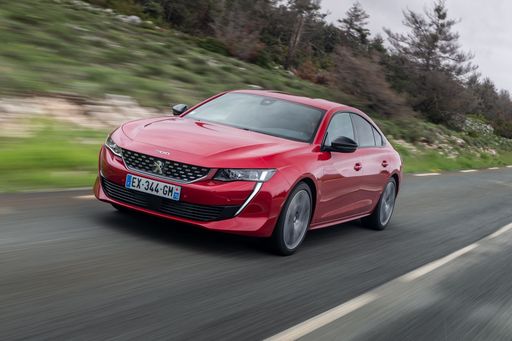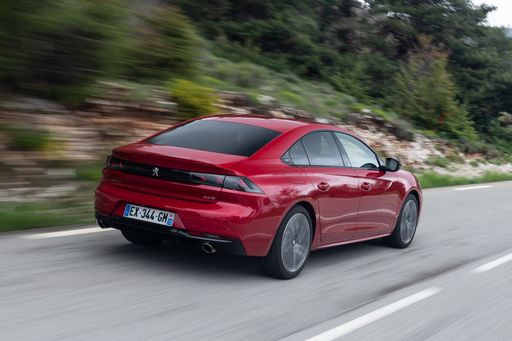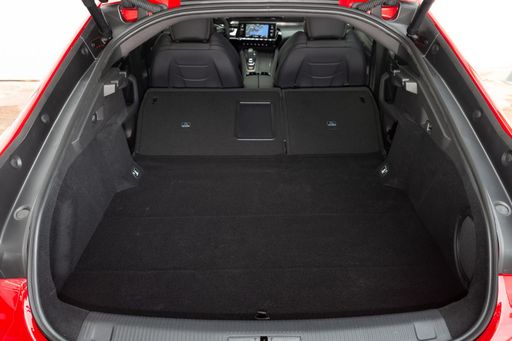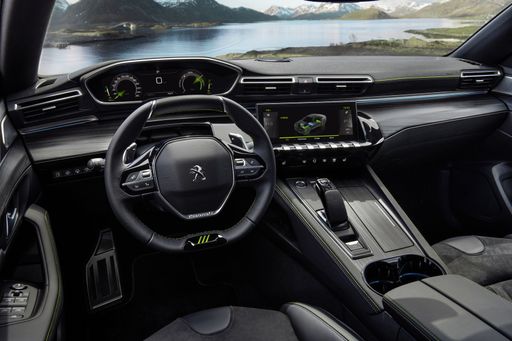Peugeot 508 vs VW Tiguan - Differences and prices compared
Compare performance (360 HP vs 272 HP), boot space and price (44600 £ vs 33300 £ ) at a glance. Find out which car is the better choice for you – Peugeot 508 or VW Tiguan?
Costs and Efficiency:
When it comes to price and running costs, the biggest differences usually appear. This is often where you see which car fits your budget better in the long run.
VW Tiguan has a evident advantage in terms of price – it starts at 33300 £ , while the Peugeot 508 costs 44600 £ . That’s a price difference of around 11271 £.
Fuel consumption also shows a difference: VW Tiguan manages with 1.40 L and is therefore slightly more efficient than the Peugeot 508 with 1.60 L. The difference is about 0.20 L per 100 km.
As for electric range, the VW Tiguan performs convincingly better – achieving up to 126 km, about 71 km more than the Peugeot 508.
Engine and Performance:
Power, torque and acceleration are the classic benchmarks for car enthusiasts – and here, some clear differences start to show.
When it comes to engine power, the Peugeot 508 has a evident edge – offering 360 HP compared to 272 HP. That’s roughly 88 HP more horsepower.
In acceleration from 0 to 100 km/h, the Peugeot 508 is somewhat quicker – completing the sprint in 5.20 s, while the VW Tiguan takes 5.90 s. That’s about 0.70 s faster.
In terms of top speed, the Peugeot 508 performs hardly perceptible better – reaching 250 km/h, while the VW Tiguan tops out at 242 km/h. The difference is around 8 km/h.
There’s also a difference in torque: Peugeot 508 pulls clearly perceptible stronger with 520 Nm compared to 400 Nm. That’s about 120 Nm difference.
Space and Everyday Use:
Beyond pure performance, interior space and usability matter most in daily life. This is where you see which car is more practical and versatile.
Both vehicles offer seating for 5 people.
In curb weight, VW Tiguan is to a small extent lighter – 1599 kg compared to 1811 kg. The difference is around 212 kg.
In terms of boot space, the VW Tiguan offers evident more room – 652 L compared to 487 L. That’s a difference of about 165 L.
In maximum load capacity, the VW Tiguan performs hardly perceptible better – up to 1650 L, which is about 113 L more than the Peugeot 508.
When it comes to payload, VW Tiguan somewhat takes the win – 533 kg compared to 469 kg. That’s a difference of about 64 kg.
Who wins the race in the data check?
The VW Tiguan is decisively ahead in the objective data comparison.
This result only shows which model scores more points on paper – not which of the two cars feels right for you.
Costs and Consumption
View detailed analysis
Engine and Performance
View detailed analysis
Dimensions and Body
View detailed analysis

VW Tiguan
Peugeot 508
The Peugeot 508 turns heads with a low-slung, almost coupe-like silhouette and a cabin that feels grown-up and surprisingly premium for the money. On the road it balances comfort and poise with a playful edge, making it a convincing choice for buyers who want something stylish and sensible without shouting for attention.
details



VW Tiguan
The VW Tiguan blends sensible family practicality with a dash of German polish, delivering a calm, reassuring ride and a cabin that never feels like an afterthought. For buyers who want an SUV that’s easy to live with yet still nicely dressed, the Tiguan is the grown‑up choice that keeps a cheeky wink in reserve.
details





Costs and Consumption |
|
|---|---|
|
Price
44600 - 60800 £
|
Price
33300 - 51900 £
|
|
Consumption L/100km
1.6 - 2 L
|
Consumption L/100km
1.4 - 8.4 L
|
|
Consumption kWh/100km
-
|
Consumption kWh/100km
-
|
|
Electric Range
46 - 55 km
|
Electric Range
118 - 126 km
|
|
Battery Capacity
-
|
Battery Capacity
19.70 kWh
|
|
co2
36 - 45 g/km
|
co2
32 - 190 g/km
|
|
Fuel tank capacity
43 L
|
Fuel tank capacity
45 - 58 L
|
Dimensions and Body |
|
|---|---|
|
Body Type
Hatchback
|
Body Type
SUV
|
|
Seats
5
|
Seats
5
|
|
Doors
5
|
Doors
5
|
|
Curb weight
1811 - 1941 kg
|
Curb weight
1599 - 1890 kg
|
|
Trunk capacity
487 L
|
Trunk capacity
490 - 652 L
|
|
Length
4750 mm
|
Length
4539 mm
|
|
Width
1859 mm
|
Width
1842 - 1859 mm
|
|
Height
1403 mm
|
Height
1656 - 1658 mm
|
|
Max trunk capacity
1537 L
|
Max trunk capacity
1486 - 1650 L
|
|
Payload
379 - 469 kg
|
Payload
460 - 533 kg
|
Engine and Performance |
|
|---|---|
|
Engine Type
Plugin Hybrid
|
Engine Type
Petrol, Petrol MHEV, Diesel, Plugin Hybrid
|
|
Transmission
Automatic
|
Transmission
Automatic
|
|
Transmission Detail
Automatic Gearbox
|
Transmission Detail
Dual-Clutch Automatic
|
|
Drive Type
Front-Wheel Drive, All-Wheel Drive
|
Drive Type
All-Wheel Drive, Front-Wheel Drive
|
|
Power HP
180 - 360 HP
|
Power HP
130 - 272 HP
|
|
Acceleration 0-100km/h
5.2 - 8.2 s
|
Acceleration 0-100km/h
5.9 - 10.6 s
|
|
Max Speed
230 - 250 km/h
|
Max Speed
210 - 242 km/h
|
|
Torque
360 - 520 Nm
|
Torque
220 - 400 Nm
|
|
Number of Cylinders
4
|
Number of Cylinders
4
|
|
Power kW
133 - 265 kW
|
Power kW
96 - 200 kW
|
|
Engine capacity
1598 cm3
|
Engine capacity
1498 - 1984 cm3
|
General |
|
|---|---|
|
Model Year
2024
|
Model Year
2024 - 2025
|
|
CO2 Efficiency Class
B
|
CO2 Efficiency Class
G, D, E, F, B
|
|
Brand
Peugeot
|
Brand
VW
|
Is the Peugeot 508 offered with different drivetrains?
Available configurations include Front-Wheel Drive or All-Wheel Drive.
